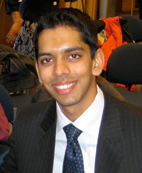Yadav Speaks At Symposium That Honors UM Student
Thursday, October 16, 2014
WDI Senior Fellow Prashant Yadav spoke Oct. 18 on global health market dynamics at the Sujal M. Parikh Memorial Symposium for Health and Social Justice at the University of Michigan (U-M).

The annual symposium, at the A. Alfred Taubman Biomedical Science Research Building, was held in honor of Parikh, a U-M medical school student who passed away in October 2010 after a road accident in Uganda. He was conducting AIDS research there as a National Institutes of Health Fogarty Clinical Research Scholar at the time of his death.
During his life, Parikh held leadership positions in several U-M, national, and international organizations, earning the respect and admiration of colleagues around the world. A believer in the collective power of committed individuals to advance health and social justice, Parikh leveraged his networks within these organizations to make each stronger.
Friends and colleagues of Parikh created the symposium to carry on his work and ensure that his spirit continues to inspire a better world.
Shortly after Parikh’s death, his parents, friends, classmates, and representatives of the numerous global health organizations to which Parikh contributed, established a fund in his memory, with the hope that the funds collected would be used to provide support for the kinds of issues and causes he was passionate about.
The symposium is the main initiative supported by the memorial fund. Parikh’s knack for bringing people together in pursuit of common goals inspired the objectives of the symposium, which include raising awareness of the role that health professionals play in the broader community to improve health equity and social justice, as well as getting others involved in learning and service opportunities.
Each year, the symposium brings together more than 200 students and professionals from academia, health professions, non-profit organizations, and the general public. Participants learn from one another, create lasting connections, and generate new ideas for the advancement of health and social justice.
